This article needs additional citations for verification .(October 2012) |
Fantastyka (est 1982, in 1990 renamed Nowa Fantastyka) is a Polish speculative fiction monthly fantasy and science fiction magazine.
This article needs additional citations for verification .(October 2012) |
Fantastyka (est 1982, in 1990 renamed Nowa Fantastyka) is a Polish speculative fiction monthly fantasy and science fiction magazine.
Fantastyka was established in 1982 by sci-fi fans Andrzej Krzepkowski, Jacek Rodek and Andrzej Wójcik , under the direction of the writer and journalist Adam Hollanek, who became the magazine’s first editor-in-chief. It became known as one of few magazines to publish both foreign and Polish short stories, as well as full-length novels in instalments. Between 1990 and 1992 its editor-in-chief was Lech Jęczmyk, followed by Maciej Parowski and Arkadiusz Nakoniecznik. In March 2006 Paweł Matuszek took over.
Andrzej Sapkowski published his first short story about The Witcher in the magazine - a debut that led to the publishing success of The Witcher saga.
Today Fantastyka is dedicated predominantly to short stories, but also to articles on modern science, film and book reviews and comic pages. In addition, it brings fandom and convention news.
Apart from Nowa Fantastyka, there have been several periodical variations of the title:
Fantastyka featured stories by Philip K. Dick, J. R. R. Tolkien, Anthony Burgess, Orson Scott Card, Kir Bulychov, and many other acclaimed writers. It was there that most of modern Polish sf/fantasy writers made their debut. Among them are Jacek Dukaj, Andrzej Sapkowski, Rafał A. Ziemkiewicz and Konrad T. Lewandowski. Finally, on the middle pages that used to be devoted to art, Fantastyka featured many renowned artists, including Enki Bilal, Wojciech Siudmak, Zdzisław Beksiński, Jacek Yerka and Jerzy Skarżyński. The comic series Lil & Put (by Maciej Kur and Piotr Bednarczyk) are currently published in the magazine, with satirical take on fantasy adventures.

Andrzej Sapkowski is a Polish fantasy writer, essayist, translator and a trained economist. He is best known for his six-volume series of books The Witcher, which revolves around the eponymous "witcher," a monster-hunter, Geralt of Rivia. It began with the publication of Sword of Destiny (1992), and was completed with the publication of standalone prequel novel Season of Storms (2013). The saga has been popularized through television, stage, comic books, video games and translated into 37 languages making him the second most-translated Polish science fiction and fantasy writer after Stanisław Lem.

Janusz Andrzej Zajdel was a Polish science fiction author, second in popularity in Poland to Stanisław Lem. His major genres were social science fiction and dystopia. His main recurring theme involved the gloomy prospects for a space environment into which mankind carried totalitarian ideas and habits: Red Space Republics, or Space Labor Camps, or both. His heroes desperately try to find meaning in the world around them.

Andrzej Ziemiański, also known as Patrick Shoughnessy, is a Polish author of fantasy, science fiction, thriller and crime, who by 2012 have sold over 500,000 copies of his books. Ziemiański was educated as an architect and he holds a PhD in architecture.

Jacek Józef Dukaj is a Polish science fiction and fantasy writer. His fiction explores such themes as alternate history, alternative physics and logic, human nature, religion, the relationship between science and power, technological singularity, artificial intelligence, and transhumanism. He is regarded among the most popular Polish contemporary science fiction authors.
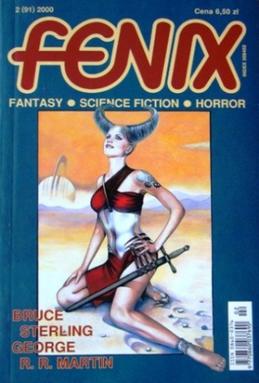
Fenix was a Polish science fiction magazine published from 1990 to 2001. It was the first privately owned magazine in the country. It was created by Jarosław Grzędowicz, Krzysztof Sokołowski, Rafał A. Ziemkiewicz, Andrzej Łaski and Dariusz Zientalak jr.

Jacek Lech Komuda is a Polish writer and historian. He specialized in the period of the Polish–Lithuanian Commonwealth and History of Poland (1569–1795), and is the author of several novels and short stories of fantasy/historical novel genre. He is a co-author of the Dzikie Pola role-playing game, and script writer for Earth 2160 computer games. He is also an editor of computer game magazine GameStar, and used to contribute to Click! and Komputer Świat GRY magazines.

Funky Koval is a Polish science fiction/detective story/political fiction genre comic book series published in Poland from the 1980s, collected in four volumes. The story was written by Jacek Rodek and Maciej Parowski, with art drawn by Bogusław Polch. The resulting science fiction comic gained a cult following in Poland and is recognized as one of the best Polish comics. It debuted in 1982 in Fantastyka, a Polish sci-fi magazine, and was later released in color albums. The final instalment was published in 2010.

Jakub Wędrowycz is the protagonist of a number of short stories by Andrzej Pilipiuk, a Polish science fiction and fantasy writer. Wędrowycz is an antihero, an elderly alcoholic, moonshine producer, poacher, amateur exorcist and fighter against all sorts of supernatural forces dwelling around his village, from aliens to vampires, demons and devils, as well as more mundane threats such as Russian mafia, policemen and tax inspectors.

Science fiction and fantasy in Poland dates to the late 18th century. During the latter years of the People's Republic of Poland, a very popular genre of science fiction was social science fiction. Later, many other genres gained prominence.
Wydawnictwo MAG, is a publisher that was the first to publish Polish translations of popular American and British role-playing games (RPGs) like Call of Cthulhu and Warhammer Fantasy Roleplay. In more recent years, it has turned to publication of translations of popular English-language novels.

Tomasz Kołodziejczak is a Polish science fiction and fantasy writer, screenwriter, publisher and editor of books, comics and role-playing games.

Extensa is a 2002 science fiction novel written by Jacek Dukaj, Polish science fiction writer. It is the second stand alone novels by Dukaj, and the first published by Wydawnictwo Literackie, marking the writer's growing recognition in Poland.

Maciej Parowski was a Polish journalist, essayist, science fiction writer, editor and translator.
Science Fiction was a Polish speculative fiction monthly magazine. It was established in 2001 under the name Science Fiction by Robert J. Szmidt, who was also the first editor. It is geared mostly towards Polish fantasy and science fiction, but occasionally publishes translations, primarily from non-English languages. The headquarters was in Katowice.

The Witcher is a series of six fantasy novels and 15 short stories written by Polish author Andrzej Sapkowski. The series revolves around the eponymous "witcher", Geralt of Rivia. "Witchers" are monster hunters given superhuman abilities for the purpose of killing dangerous creatures. The Witcher began with a titular 1986 short story that Sapkowski entered into a competition held by Fantastyka magazine, marking his debut as an author. Due to reader demand, Sapkowski wrote 14 more stories before starting a series of novels in 1994. Known as The Witcher Saga, he wrote one book a year until the fifth and final installment in 1999. A standalone prequel novel, Season of Storms, was published in 2013.
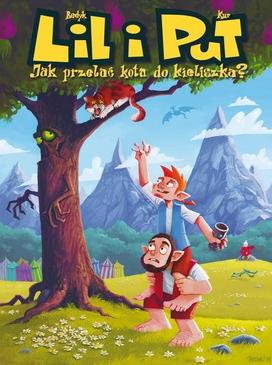
Lil and Put is an ongoing comedy-fantasy Polish comic book series for children created by Maciej Kur (script) and Piotr Bednarczyk (art).
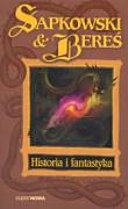
Historia i fantastyka is a book-length interview of Polish fantasy writer Andrzej Sapkowski conducted and published in book format by Stanisław Bereś in 2005.
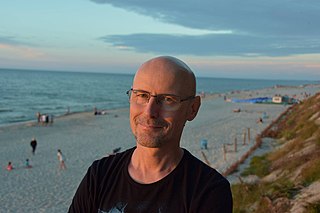
Marcin Sergiusz Przybyłek is a Polish science fiction author, business trainer, coach, computer games designer and consultant, a medical doctor by education.
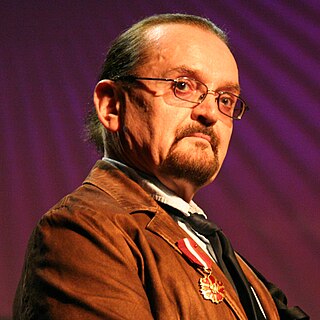
Bogusław Polch act. Połch was a Polish comic book artist. His most notable works include the series The Gods from Outer Space, Funky Koval and Wiedźmin. He also illustrated the covers of the first editions of most of Sapkowski's books in The Witcher series.
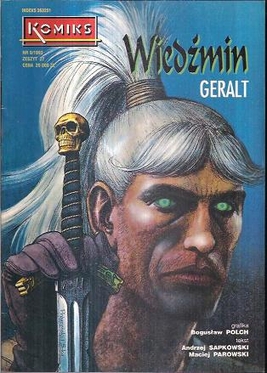
The Witcher is a six-issue comic books series, written by Maciej Parowski and illustrated by Bogusław Polch, mostly adapting Andrzej Sapkowski's early stories about The Witcher. It was released from 1993 to 1995 in the Komiks magazine published by Prószyński i S-ka. The comics were the first attempt to portray The Witcher universe outside the novels. While initially the series received mixed reviews, it has become more popular later, and is accepted as an important milestone in the development of The Witcher's franchise, as well as setting the visual style of the universe.